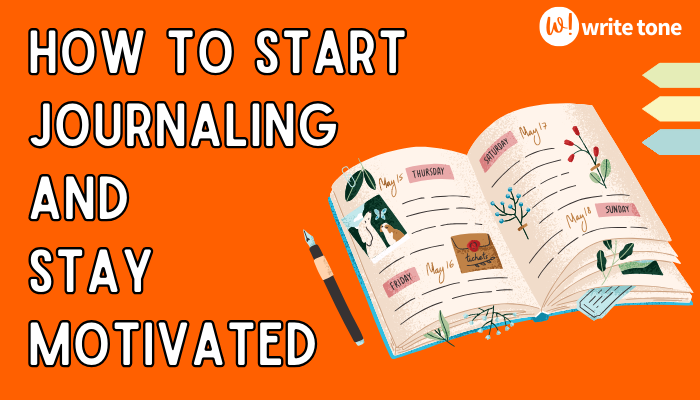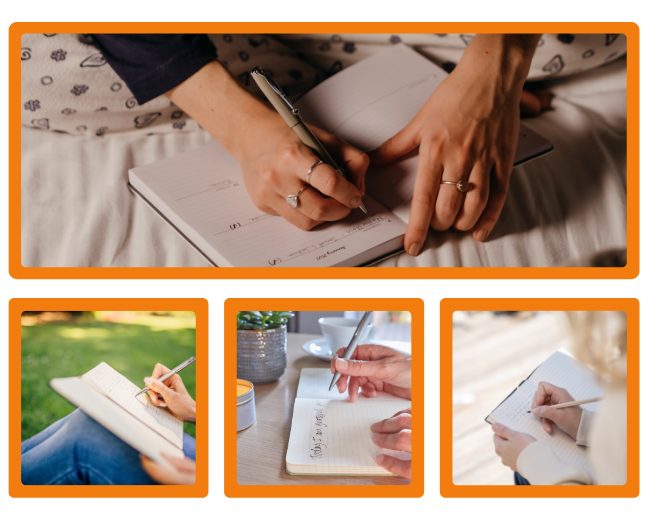Journal Writing: How to Start Journaling and Stay Motivated

Journaling is a simple but powerful practice that can have a big impact on your life. It's a way to record your thoughts, feelings, and experiences, and it provides a private space for self-reflection and personal growth. Whether you're new to journaling or looking to get back into it, this guide will help you get started and stay motivated on your journaling journey.

The Benefits of Journaling
Before we get into the nitty-gritty of how to journal, let's talk about why you should journal in the first place. Journaling has a ton of benefits for your mental, emotional, and even physical health
|Improve your writing
and editing skills with this FREE AI tool >
Here are a few reasons why you should start journaling
today:
- Clarity and Self-Reflection:
- Stress Reduction:
- Goal Setting and Achievement:
- Creativity Boost:
- Emotional Regulation:
- Self-Discovery:
Journaling can help you understand yourself better. When you write down your thoughts and feelings, you can see them more clearly. You can identify patterns in your thoughts and behaviours, and you can start to see yourself from a new perspective. This can lead to greater self-awareness and self-acceptance.
Writing in a journal can help you relieve stress. It's a healthy way to process your thoughts and feelings. When you write about what's bothering you, you can start to let go of it. Journaling can also help you identify the sources of your stress, so you can take steps to address them.
A journal can help you set and track your goals. When you write down your goals, you make them more real and achievable. You can also use your journal to brainstorm solutions to problems and to stay motivated on your journey to success.
Journaling can unleash your creativity. It's a safe space to explore new ideas, brainstorm solutions, and capture fleeting moments of inspiration. When you write about your creativity, you can start to see patterns in your thinking, and you can develop your creative skills.

Writing about your emotions can help you manage them more effectively. When you write about how you're feeling, you can start to understand your emotions better. You can also start to develop healthy coping mechanisms for dealing with difficult emotions.

Your journal is a treasure trove of self-discovery. Over time, you can identify patterns in your thoughts and behaviours, and you can start to make positive changes in your life. You can learn more about yourself, and you can become the person you want to be.
Now that you understand the numerous benefits of journaling, let's explore how to start and maintain a journaling practice:
Getting Started with Journaling
- Choose Your Journal:
- Set a Regular Time:
- Create a Comfortable Space:
- Start with Prompts:
- Write Freely:
Start by selecting a journal that resonates with you. It could be a traditional paper journal, a digital journaling app, or even a simple notebook. The key is to choose a format that you're comfortable with.
Establish a journaling routine by picking a consistent time each day to write. It could be in the morning to set intentions for the day or in the evening to reflect on your experiences.
Find a quiet, comfortable place to journal. This could be a cozy corner in your home, a park bench, or a coffee shop—wherever you feel relaxed and inspired.

If you're unsure what to write about, consider using prompts to kickstart your journaling sessions. Prompts can be questions, quotes, or topics that guide your reflection.
|USE this FREE AI
writing assistant tool >
Remember that there are no rules in journaling. Write freely and honestly. Your journal is a judgment-free zone, so don't worry about grammar or punctuation.
Staying Motivated with Journaling
- Set Realistic Goals:
- Celebrate Small Wins:
- Experiment with Styles:
- Find Inspiration:
- Be Patient:
- Reflect on Your Progress:
Define clear objectives for your journaling practice. Whether it's to reduce stress, enhance self-awareness, or achieve specific goals, having a purpose will keep you motivated.
Acknowledge your achievements in your journal. Celebrate the progress you've made, no matter how small. It's a great way to boost your motivation.
Journaling doesn't have to be limited to traditional writing. Try different styles like bullet journaling, art journaling, or gratitude journaling to keep things fresh.
Seek inspiration from books, blogs, or other journalers. Reading about others' journaling journeys can reignite your passion for the practice.
Journaling is a long-term commitment. There may be days when you don't feel like writing, and that's okay. Be patient with yourself and return to your journal when you're ready.
Periodically review your journal entries to see how far you've come. Reflect on the insights you've gained and the positive changes in your life.
Incorporating Journaling into Your Life
Journaling is a flexible practice that can be adapted to your needs and preferences. Whether you write daily, weekly, or sporadically, the key is to make journaling a meaningful and fulfilling part of your life.
Remember, journaling is all about exploring yourself and growing as a person. Enjoy it, and let your journal be your buddy as you learn more about yourself and grow along the way